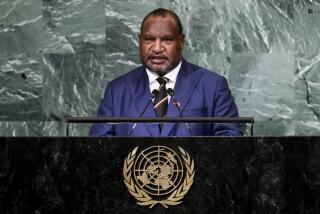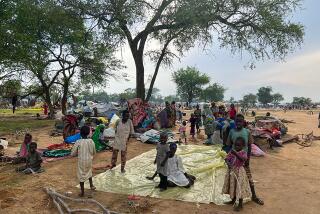Clashes leave at least 30 dead in volatile region of Sudan
- Share via
Reporting from Juba, Sudan — Clashes in recent days between Arab nomads and tribesmen have left at least 30 people dead and raised fears that the independence referendum in southern Sudan could lead to widespread violence in the disputed, oil-rich region of Abyei.
Straddling the volatile area where northern and southern Sudan meet, Abyei has a dangerous mix of heavily armed Arab cattle herders loyal to the northern-based government of President Omar Hassan Ahmed Bashir and Dinka Ngok tribesmen aligned with the southern leadership.
The region has long been a tinderbox. The south and the northern-led government in Khartoum have accused each other of manipulating Abyei’s clans as proxies in a larger struggle over control of grazing lands, water and oil. A separate referendum this week on whether Abyei would join the north or south was delayed over unresolved political issues and fears of renewed bloodshed.
“We will not accept Abyei to be part of the south,” Bashir told Al Jazeera television over the weekend. “If any party takes independent action over Abyei, that would be the beginning of a conflict.”
This has left the territory in a precarious limbo. Exactly what has happened over the last three days is difficult to discern in a landscape where northern and southern armies have bolstered their forces in recent months. A Times special correspondent trying to reach Abyei from the north was turned away by soldiers.
Members of the Misseriya, a Sudanese Arab nomadic tribe linked to the north, said they were ambushed while grazing their cattle. But southern Sudanese officials say Sudanese Arab nomads supported by a Khartoum-backed militia battled Dinka tribesmen and attacked southern police forces near the border. Reports on the death toll vary, ranging from 30 to 36.
“Thirteen of our people were killed in cold blood by the Dinka Ngok and the southern army,” Muhammad Hamid Zamil, a Misseriya leader, said of the fighting that occurred about 30 miles north of Abyei town near Um Gheito. “The Dinka are breaking agreements.”
He said more than 2,000 of his clansmen were meeting over whether to attack Abyei and neighboring towns. “We will not be passive bystanders. We will defend our land, religion and country,” he said. “Abyei is ours. It doesn’t belong to the Dinka Ngok. They were our guests. Now the guest has turned on us. But we will take the land soon.”
The clashes erupted in the days leading up to the weeklong referendum that began Sunday to determine whether the mostly Christian and animist south wants to secede or remain part of Sudan. The south, which fought a civil war with the predominantly Muslim north that left about 2 million people dead, is expected to vote to split Africa’s largest country in two.
If that happens, the south will take with it about 80% of the country’s oil output. This has made control of the oil fields around Abyei strategically and economically critical to the north. Tensions have also grown over who should decide Abyei’s fate. The Misseriya, who graze and water their cattle in the area for part of the year, claim they have the same right to Abyei as the Dinka farmers who live there year-round.
Special correspondent Alsanosi Ahmed in El Obeid, Sudan, contributed to this report.
More to Read
Sign up for Essential California
The most important California stories and recommendations in your inbox every morning.
You may occasionally receive promotional content from the Los Angeles Times.











